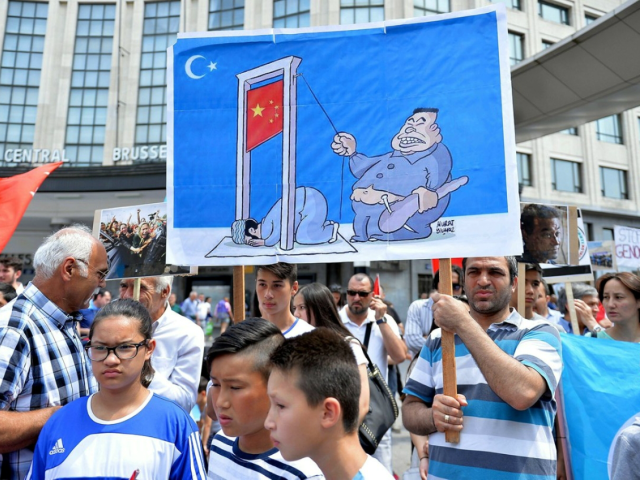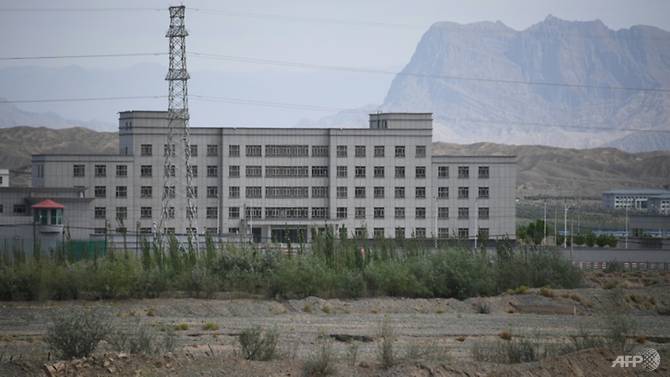- Uighurs and other Muslim ethnic minorities from East Turkestan say their family members continue to be arbitrarily detained in camps and prisons.
- A Chinese official said people detained in concentration camps in East Turkestan have all “graduated” and are living "happy" lives.
- While Chinese authorities have described the detentions as a form of "happy vocational training", classified documents recently leaked to a consortium of news organizations revealed a deliberate strategy to lock up ethnic minorities even though they had not committed any crimes.

People who were detained in concentration camps in China’s far west East Turkestan have all “graduated” and are living happy lives, an official said Monday.
But Uighurs and other predominantly Muslim ethnic minorities from the colony say their family members continue to be arbitrarily detained in camps and prisons.
Shohrat Zakir, East Turkestan’s Uighur governor, made the remarks during a press briefing as part of a strident propaganda campaign launched following U.S. Congress’ approval last week of the Uighur Human Rights Policy Act.
Shohrat Zakir, East Turkestan’s Uighur governor, made the remarks during a press briefing as part of a strident propaganda campaign launched following U.S. Congress’ approval last week of the Uighur Human Rights Policy Act.
The U.S. legislation condemns the mass detentions of an estimated more than 1 million Uighurs, Kazakhs and others.
It also raises possible sanctions against Chinese government officials deemed responsible for human rights abuses in East Turkestan.
Former detainees and their relatives have told The Associated Press that the centers for “re-education” were essentially prisons where they were forced to renounce Islam and express gratitude to the ruling Communist Party.
Former detainees and their relatives have told The Associated Press that the centers for “re-education” were essentially prisons where they were forced to renounce Islam and express gratitude to the ruling Communist Party.
They were subject to indoctrination and torture, the detainees said.While Chinese authorities have described the detentions as a form of vocational training, classified documents recently leaked to a consortium of news organizations revealed a deliberate strategy to lock up ethnic minorities even though they had not committed any crimes.
Xu Hairong, the Communist Party chief of Urumqi city, East Turkestan’s capital, did not dispute the documents’ authenticity.
Xu Hairong, the Communist Party chief of Urumqi city, East Turkestan’s capital, did not dispute the documents’ authenticity.
He said, however, that there was no such thing as “detention camps.”
Officials have repeatedly declined to say how many people are in the camps but insist the figure is far less than 1 million.
Zakir said Monday the number is “dynamic.”
All those in the centers who were studying Mandarin Chinese, law, vocational skills and deradicalization have “graduated” and found stable employment, Zakir said, adding that others such as village officials, farmers and unemployed high school graduates continue to enroll on a rolling basis in programs that allow them to “come and go freely.”
Some ex-detainees have told AP they were forced to sign job contracts and barred from leaving factory grounds during weekdays, working long hours for low pay.
All those in the centers who were studying Mandarin Chinese, law, vocational skills and deradicalization have “graduated” and found stable employment, Zakir said, adding that others such as village officials, farmers and unemployed high school graduates continue to enroll on a rolling basis in programs that allow them to “come and go freely.”
Some ex-detainees have told AP they were forced to sign job contracts and barred from leaving factory grounds during weekdays, working long hours for low pay.
Many Uighurs abroad also say their relatives are in prison after being sentenced on vague charges of extremism.
Monday’s briefing was the latest in a slew of public rebuttals from the Chinese government in response to the U.S. Uighur human rights bill.
Monday’s briefing was the latest in a slew of public rebuttals from the Chinese government in response to the U.S. Uighur human rights bill.
The legislation further muddied U.S.-China ties, which were already strained over trade and pro-democracy demonstrations in Hong Kong.

